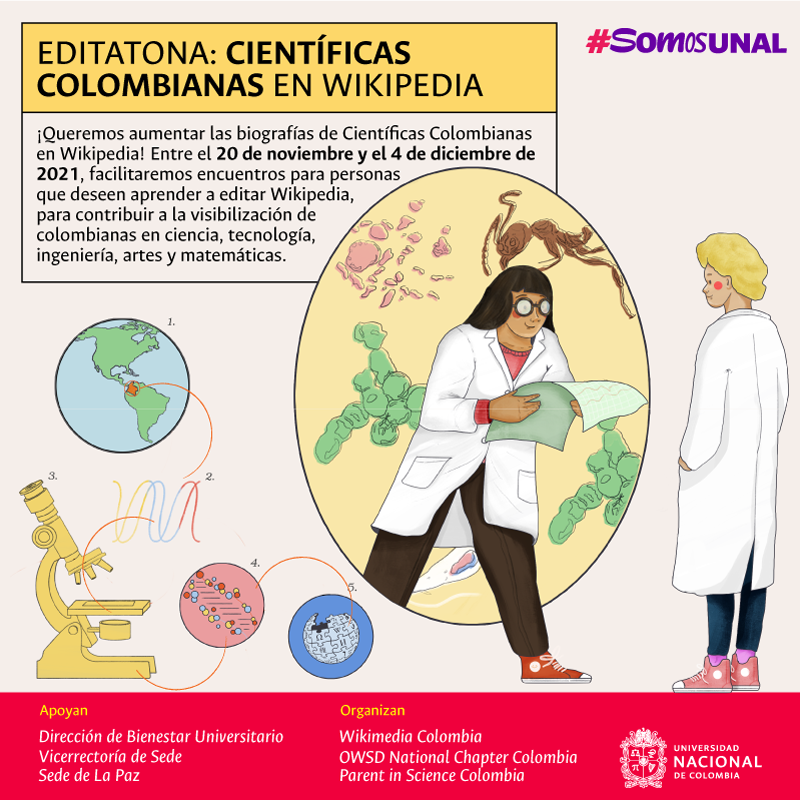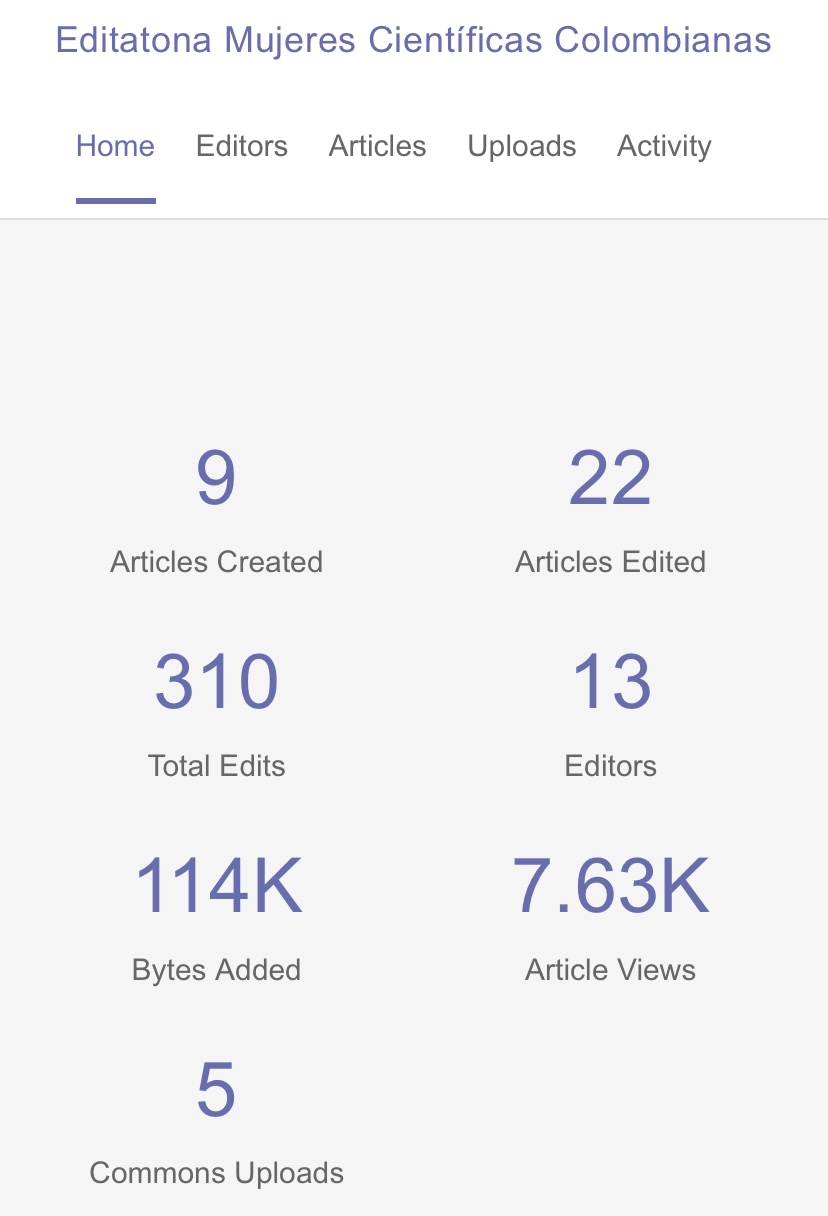Wikimedia Colombia joins the commemoration of women in science and we want to invite you to continue working and writing so that many more of them are on Wikipedia. There are still many articles about the work of great Colombian women scientists in Wikipedia and we want to keep writing about them. Do you want to join our mission?
Wikipedia is the 13th most visited website in the world, and unfortunately the vast majority of biographies on the platform are of men (mainly European or North American). So several organizations around the world have been promoting the increase of women scientists’ biographies on Wikipedia, and thanks to the training sponsored by 500 Women Scientists in 2021 (several of the organizers of the Editatona did it), we were inspired and wanted to contribute to this movement in Colombia.
Last year Wikimedia Colombia, Parent in Science Colombia, OWSD Colombia and the Universidad Nacional joined forces and energy in the framework of an editatona to create and improve articles by Colombian women scientists on Wikipedia. An editatona is a collective and simultaneous editing event in Wikipedia, in which people with different levels of expertise meet in person or virtually to improve or create articles, usually proposed in advance and related to a specific topic, in this case we were going to create articles about Colombian women scientists.
We developed this editatona from the call to a group of 13 women interested in contributing to Wikipedia, they are Colombian scientists, professionals and academics. The objective of the editatona was to make Colombian women scientists visible in the largest collaborative encyclopedia in the world: Wikipedia.
Thus, for about a month we met for three consecutive Saturdays, we talked about Wikipedia as a source of information and representation, also about the gender gap, the problems of notability of Colombian women scientists, which in the case of women who do science, ends up being a double gap: for being women and for being scientists. This, according to research by the Wikimedia Community, is also replicated in the ecosystem projects.
In the meetings we also had discussions about the pillars of the digital encyclopedia, the rules that exist to create or modify articles. The sources of information and their relevance in Wikipedia. We developed practical exercises in which we learned to use tools such as the visual editor, workshop and we had peer reviews of articles. In the last session we were joined by Carmen Alcazar, the current executive director of Wikimedia Mexico and founder of Editatona, the international initiative that seeks to bridge the gender gap in Wikipedia and Wikimedia projects.
In this editatona we created nine (9) new articles, edited 22 articles, and had a total of 310 edits. There were 13 editors, who added about 114K bytes. The articles have had 7.36 K views and added 5 images to Wikimedia Commons. The profiles created are of women scientists who have made contributions to aerospace engineering, physics, climatology, medicine, pharmacy, anthropology, archeology, chemistry, botany and legislation. The work and contributions of these women scientists are references both nationally and internationally and now we find them in Wikipedia, also as an initiative that could inspire girls and women to follow their trajectory, and have them as references and role models.
As part of this commemoration, we would like to share the new and improved articles, so that you can read them and, of course, help us to complement them. This is the list of contributions.
Articles created
- Martha Lucía Ospina Martínez
- Alicia Dussan de Reichel
- Ana María Rey
- Ángela Maldonado
- Adriana Navarro Suarez
- Carla Faria
- Lucy Gabriela Delgado Murcia
- Kleinsy Bonilla
- Alba Luz Arbelaez Alvarez
- Alegría Fonseca
Improved articles
- Diana Trujillo
- Ángela Stella Camacho
- Kate Marvel
- Kizzmekia Corbett
- Instituto Nacional de Salud (Colombia)
- Universidad del Tolima
Regarding our learning, we now know more about Wikipedia, we also know that it is not difficult to contribute and that we can use our work and support networks to review and continue adding knowledge to the most consulted digital encyclopedia on the Internet. We all have something to say and to contribute to Wikipedia, it can be from our professions, also from our hobbies and interests, from gaps we find in the information available on the Internet. We can also contribute to make the voices that are silenced or inaudible, or the contributions that many people make to society on a daily basis. In the end we are left with the invitation to continue learning and contributing from a more participatory position in the contents and information that circulate on the Internet.
We take advantage of this commemoration to invite you to participate in a discussion where we will talk about Colombian Women Scientists in Wikipedia. This activity will be carried out in partnership with El Espectador and we will have the participation of Lina Caballero (Biologist. Ph.D in genetics and molecular biology. Director of Welfare, National University of Colombia, La Paz. Founder of Parent in Science Colombia), Maria Monica Monsalve (Journalist of Vivir de El Espectador) and Monica Bonilla (Executive Director of Wikimedia Colombia). You can register for the event through the following form and also tell us which articles about Colombian women scientists you want to create. This way we can make sure you have a safe and enjoyable environment on the Internet to share our knowledge and strengthen the community of Wikipedians around the world.
Credits
This editatona was coordinated and led by Dr. Martha Lucia Borrás-Guevara (Goldsmiths, University of London), Dr. Lina María Caballero Villalobos (Director Bienestar Universidad Nacional sede La Paz. Founder of Parent in Science Colombia), Dr. Karina Mondragon-Shem (Liverpool School of Tropical Medicine) and Monica Bonilla-Parra (Executive Director of Wikimedia Colombia).

Can you help us translate this article?
In order for this article to reach as many people as possible we would like your help. Can you translate this article to get the message out?
Start translation

